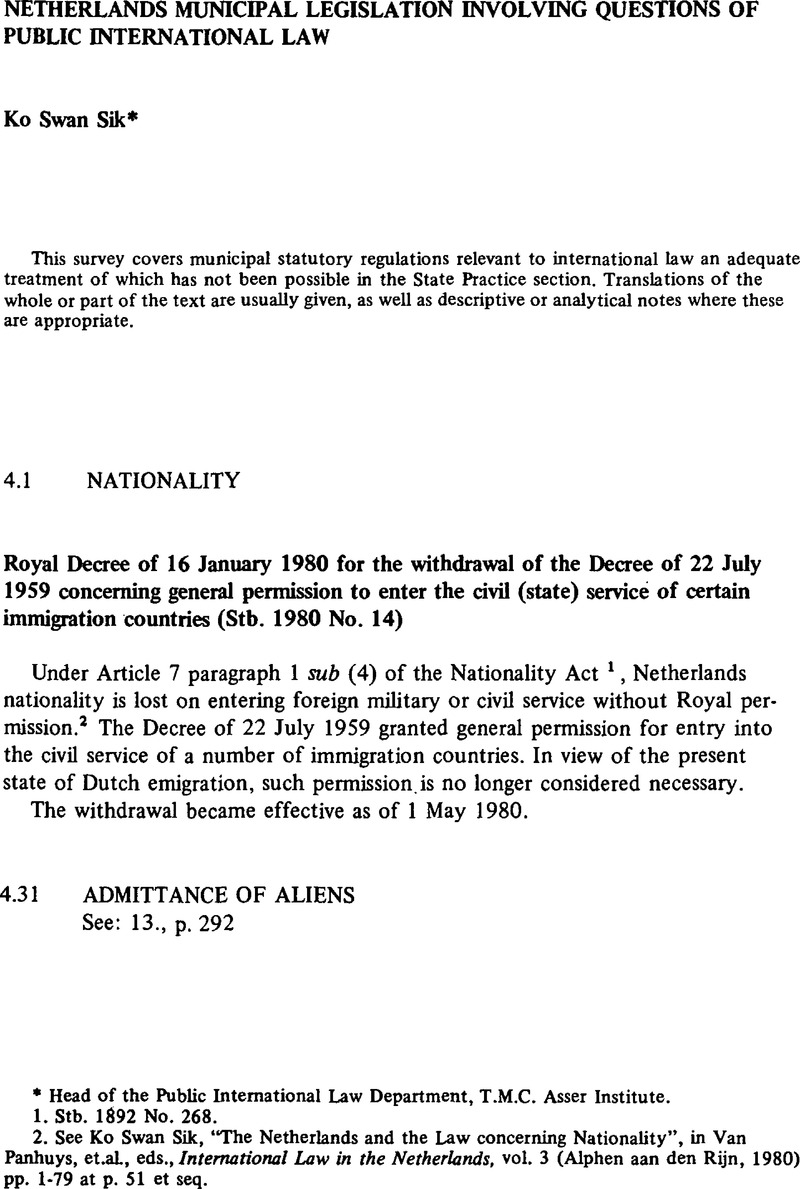No CrossRef data available.
Published online by Cambridge University Press: 07 July 2009

1. Stb. 1892 No. 268.
2. See Ko Swan, Sik, “The Netherlands and the Law concerning Nationality”, in Van Panhuys, et al. , eds., International Law in the Netherlands, vol. 3 (Alphen aan den Rijn, 1980) pp. 1–79 at p. 51 et seq.Google Scholar
3. See, for the procedure applicable to constitutional revision, 11 NYIL (1980) p. 284.
4. Act relating to the prevention of shipping accidents and the institution of an investigation into shipping accidents, and to disciplinary measures against captains, navigators, and engineers of 1 July 1909 (Stb. 1909 No. 219), as amended. Modified text re-published in Stb. 1932 No. 86. Latest modification of Art. 67 in Stb. 1968 No. 21.
5. Art. 67 of the Ships Act enables certain rules concerning Dutch ships to be declared applicable to ships of foreign nationality, subject to certain conditions: the absence of comparable rules in the country of nationality, or the applicability to Dutch ships of comparable rules in the country of nationality.
6. According to the Royal Decree of 9 April 1980, Stb. 1980 No. 170.
7. Stb. 1935 No. 599.
8. Stb. 1935 No. 621.
9. Examples of such Ministerial Decrees are: The Decree of the Ministers for Foreign Affairs and of Economic Affairs of 21 November 1980 relating to licensing arrangements for South Africa, and the Decree of the Ministers for Foreign Affairs and of Transport of the same date, relating to the transport of arms to South Africa. Text of both Decrees in Stc. of 24 November 1980, No. 228. Both Decrees served to implement UN Security Council Resolution 418 of 4 November 1977, which reads, inter alia: “(2). Decides that all States shall cease forthwith any provision to South Africa of arms and related matériel of all types, including the sale or transfer of weapons and ammunition, military vehicles and equipment, para-military police equipment, and spare parts for the aforementioned, and shall cease as well the provision of all types of equipment and supplies and grants of licensing arrangements for the manufacture or maintenance of the aforementioned.” See also infra, 13.2.
10. See 5 NYIL (1974) p. 358.
11. Another result of this Resolution is the Ministerial Decree of 3 January 1980 (Stc. 8 Jan. 1980 No. 5, p. 7) repealing the Southern Rhodesia Import and Export (Royal) Decree 1966 (Stb. 1966 No. 289), which was promulgated by virtue of the 1962 Import and Export Act. See 8 NYIL (1977) pp. 331–3. For the possibility of a Ministerial Decree repealing a Royal Decree, see infra, n. 14.
12. Decree of 26 April 1963, Stb. 1963 No. 128.
13. See 8 NYIL (1977) p. 331.
14. The Decree has undergone the following modifications: First, 20 July 1965, Stb. 1965 No. 338; Second, 10 May 1967, Stb. 1967 No. 291; Third, 14 August 1970, Stb. 1970 No. 416; Fourth, 17 September 1971, Stb. 1971 No. 587; Fifth, 21 July 1973, Stb. 1973 No. 394; Sixth, 7 October 1977, Stb. 1977 No. 586. The Seventh modification, discussed here, has been followed by an Eighth modification, introduced by the Ministerial Decree of 26 August 1980, Stc. 1980 No. 167. Modification of a Royal Decree by a Ministerial Decree is made possible under Arts. 7 and 8 of the Import and Export Act, in urgent situations. The Ministerial Decree referred to has a maximum validity of eight months, and should normally be substituted by a Royal Decree.
15. Viz., Albania, Bulgaria, GDR, Hungary, Kampuchea, (North) Korea, Laos, Mongolia, Poland, Romania, Czechoslovakia, USSR; Vietnam, China.
16. Stb. 1954 No. 542. The Decree was implemented by Ministerial Decree of 10 August 1963, Stb. 1963 No. 156.
17. Uitvoerverbodenwet, Stb. 1935 No. 599. See 8 NYIL (1977) p. 331 n. 18. This Act has now been repealed; see supra, p. 292.
18. See 8 NYIL (1977) p. 331.
19. This Decree has been withdrawn by Art. II of the present Decree.
20. See 8 NYIL (1977) p. 331, and p. 332 n. 20.
21. This wording derives from the 1962 Import and Export Act, see ibid.
22. In view of the urgent character of the measures a provisional withdrawal took place earlier by Ministerial Decree. See Stc. of 8 January 1980, No. 5.
23. 11 NYIL (1980) p. 285.
24. The Act has entered into force on 1 May 1981 by Royal Decree of 11 March 1981 (Stb. 1981 No. 73).
25. Art. 22 of the Act.
26. Act of 14 November 1934, Stb. 1934 No. 583.
27. Royal Decree of 10 October 1945, Stb. 1945 No. F222.
28. Published in Stc. 17 May 1977 No. 95.
29. Art. 46 reads: “1. The Ministers referred to in Art. 1 will issue the necessary additional and implementation regulations.
2. Whenever necessary for the achievement of the purposes of this Decree the regulations referred to may include further restrictive provisions, obligations, and prohibitions, as well as exceptions to the restrictive provisions, obligations, and prohibitions established in this Decree.”
30. See 8 NYIL (1977) p. 331.
31. Trb. 1979 No. 38; also in: Recueil des Conventions de la Haye (1973 ed., published by the Hague Conference of Private International Law), p. 153 et seq.Google Scholar